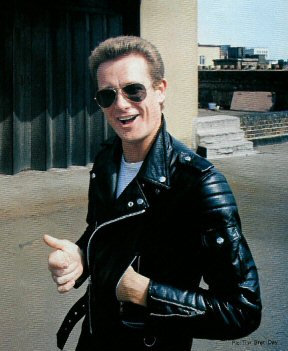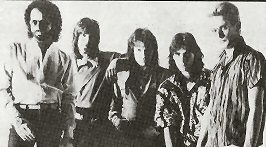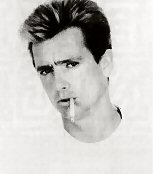|
GRAHAM BONNET A CHANGE IS AS GOOD AS ARREST Now that ex-Frank Zappa man and 'real musician' STEVE VAI has taken over from guitarist YNGWIE MALMSTEEN, the new-look ALCATRAZZ are taking no prisoners, reports PAUL SUTER  FAR DISTANT memories flash through my palpitating cerebral cortex, jarring the prickling synapses with, their vibrant energy. Flicking on and off like some supernatural intrusion into the id, the minutiae of dementia burn deeply into the inner self, scourging and cleansing away the disease-encrusted remains of a former life. My Roget's Thesaurus falls by my side. I have successfully fleshed out the first paragraph with complete and utter bollocks.
FAR DISTANT memories flash through my palpitating cerebral cortex, jarring the prickling synapses with, their vibrant energy. Flicking on and off like some supernatural intrusion into the id, the minutiae of dementia burn deeply into the inner self, scourging and cleansing away the disease-encrusted remains of a former life. My Roget's Thesaurus falls by my side. I have successfully fleshed out the first paragraph with complete and utter bollocks.But beware the logic, of it all; the crucial link: bollocks Well, nearly the crucial link, only a gallstone's throw away, actually. Graham Bonnet must be extremely relieved that the pertinency of his plonker to the history of Alcatrazz is rapidly fading away, with the band now established as a going concern rather than an unknown quantity, and with much more musical questions to ask than whether he really did and was it worth it. Probably reflecting the fact that there is now a band to talk about rather than just a bunch of people relating their own life stories because their band doesn't have one, the atmosphere in the Alcatrazz camp is relaxed and jovial, with Bonnet in particular anxious to couch common sense in as much silliness as possible. His bouncy repartee invokes memories of a previous encounter for Snouds years ago. "God, we talked for ages and I can't remember a thing we said. I was f**king smashed!" It was at the time of his 'Night Moves' album (which I never heard - aargh!) and Graham still had a few interesting moves ahead of him at the time, but at last he appears to have settled in his path, doing what he wants to do with people he wants to work with. NOT THAT this was the case with Alcatrazz not so long ago, as Bonnet made clear when the tape started to roll, with the inevitable first question focussing on the departure of guitarist Yngwie Malmsteen, Mr Hot Property of 1983 having evidently, failed to become Mr Most Wanted of 1984. Bearing in mind the main topic of the last round of Alcatrazz interviews, is Bonnet perhaps thinking that the subject matter is merely moving from one prick to another? "No comment, I'd rather not talk about him. He was very fortunate to be in this band, and he's fortunate to be out of it, too, so the less said about that person the better. I don't want to promote him in any way. "Now we have Steve Vai who's a real individual, he doesn't try to emulate anybody. We have someone who's a musician, who isn't just looking out for himself as a rock star. And, of course, he'll drop his trousers for anyone... "No, seriously, our other guitarist had a real individual style put that in inverted commas, please! - and... Steve had something which this band needed - talent. We're very proud to have him in the band (round of applause, Steve grins with embarrassment). There are a lot of little things which are showing now that weren't there before; the band was far too guitar oriented but this time Steve has considered how the band should be arranged musically, how all the parts should be put together."  Indeed Steve Vai is credited with arranging all the material and has clearly taken over as the musical director of Alcatrazz, but in a manner much more sympathetic to his colleagues than that of his predecessor. It's a little bizarre, then, to reflect that Vai came to Alcatrazz from five years with Frank Zappa - you can see the heritage with other former Zappa men like Eddie Job son and Terry Bozzio, but what's one of his guitarists doing in a talented but clearly straight ahead rock band? Spill the beans Steve, are you busking madly or what?
Indeed Steve Vai is credited with arranging all the material and has clearly taken over as the musical director of Alcatrazz, but in a manner much more sympathetic to his colleagues than that of his predecessor. It's a little bizarre, then, to reflect that Vai came to Alcatrazz from five years with Frank Zappa - you can see the heritage with other former Zappa men like Eddie Job son and Terry Bozzio, but what's one of his guitarists doing in a talented but clearly straight ahead rock band? Spill the beans Steve, are you busking madly or what?"This is just as challenging, let me tell you. I've always had rock music in my heart - before I played with Frank I was studying at Berkeley, but before that I was in a rock band so it's always been there, and after Frank I wanted to get back into it. "I heard that Alcatrazz were looking for a guitarist and I knew of Graham just by reputation; Yngwie was still with the band at the time but they had decided to replace him and Jimmy (keyboards player Jimmy Waldo) gave me a call. I don't think that the fact that I'd been with Zappa helped a lot, and it had crossed my mind that it might obstruct me getting involved with a rock band again. In fact I had submitted tapes to Ozzy and Kiss but I never got calls and I heard later that the Zappa background had put them off." "We needed a real musician," is how Jimmy Waldo explains the band's positive interest in Vai with his Zappa background. "Of course we wanted flash, someone who could play his ass off," he concedes, "but we also wanted a musician who understod all about writing and arranging. Someone who didn't just think about guitar, but about music and vocals too - about the whole band. With a background in Zappa's outfit we knew he'd be a gret musician." ALCATRAZZ HAVE surely made great advances in the transition from first album to second. Whilst I'll not stir from the notion that on record at least Malmsteen did bring a touch of class to the band's delivery, Vai brings something much more immediate and equally desirable with him - a touch of rock and roll. Malmsteen evidently did exactly what he wanted, Vai wants to do what Alcatrazz need. He co-wrote every track on the album, with his rock and roll heart clearly on his sleeve despite his sublimation into the world of Zappa for five years. "I knew the guys and what they needed. I'd seen the band before I joined (Vai was actually selected before the final tour with Malmsteen) and it looked awkward, things were going on which weren't quite gelling, the music they were playing didn't seem to come naturally." "We wanted to be a real aggressive rock and roll band and pump it out," bassist Gary Shea nods, "but we found that there was nothing progressive in trying to play classical licks that were written centuries ago; by, people who were better than us. Anyway Ritchie Blackmore and those, guys were doing all that stuff 15 years ago. We felt awkward, and because of its precision it was very cold too - you have to play it the proper way, but rock and roll has more of a groove to it, there's a bit of give and take and that's where the character comes out. "A lot of your ability comes from your environment," Steve continues, "and I learned a lot of adaptability from working with Zappa. I saw him do things that defied a musician's logic, but they worked. We were listening to a cowboy station once on the radio and he said 'I could write a song like that in five minutes'. And in five minutes he'd got it he wrote and arranged it whilst we played it with him yelling out the chords. It's a country song that would fool anybody - it's called 'Harder Than Your Husband'. And then I've also seen him write a symphony for the LSO, and then he'll go on stage and sing'f**k me you ugly sonofabitch'! Just like people didn't realise that they could sing and play guitar until they saw the Beatles do it, I didn't realise that I could play for him and write for a real rock and roll band until I saw what he could do. He convinced me."  THE RESULT of Steve Vai's creative input is 'Disturbing The Peace', a release the ever-studious Mr Johnson dubbed in these pages 'a bloody great album' (Kerrang! 90), a much more upstanding effort than its predecessor, and chock full of class and clout. Just to prod Mr Johnson a smidgeon I'll point out that he didn't even mention the best track, the vibrant 'Painted Lover', but overall it's a much more balanced and effective record than the first album.
THE RESULT of Steve Vai's creative input is 'Disturbing The Peace', a release the ever-studious Mr Johnson dubbed in these pages 'a bloody great album' (Kerrang! 90), a much more upstanding effort than its predecessor, and chock full of class and clout. Just to prod Mr Johnson a smidgeon I'll point out that he didn't even mention the best track, the vibrant 'Painted Lover', but overall it's a much more balanced and effective record than the first album."After the first album," Graham agrees, "we realised that there had too be some sort of improvement and we took much more time to work out the songs this time. Actually the first album was really rushed, it was even a rush to find a guitar player in time. We tried out a few', and 'Ingrid' was only the one who came closest to what we needed. "I think this album is 100% better than the first because of all the preparation which went into it, and we managed to steer away from that Heavy Metal tag into a wider audience." Jimmy Waldo seems particularly perturbed by the fact that Alcatrazz were getting classified as an HM band. Fair enough, it's an audience, but for their own ambitions the wrong one. "Even with the first record I couldn't really see us as a Metal band, just a heavy rock band. Heavy Metal is like Walt Disney, caricatures like Motley Crüe and so on - it's a role I don't want to play." "What we're trying to, put across on this album," Graham continues, "is that it's music, it's not just guys trying to show how well they can play. We're not part of any trend, we play what comes naturally now. The guys in Deep Purple could play anything,; C&W if they wanted, but they're too scared to make any move away from what's expected of them. We're lucky because we're still new and we do whatever comes naturally and it's still us. "We don't have to contrive to play Alcatrazz music, there's no fashion to follow and it doesn't have to be done in a certain way. We're not going to try and copy Ratt, we're not going to sing about the devil well we might, but it'll be as a joke!" "When you're writing," Steve confesses, "there are a lot of things trying to get into your head - like Ratt! - and it is hard to sit down and be original. You can't let anything take control of you, you've got to just let it come, naturally." In the course of our conversation the theme of doing what comes naturally seemed to be a recurrent one, with Alcatrazz showing a clear disdain for most of the trappings of the modem day music biz and its tendency too allocate a certain image whether you like or not, Bonnet in particular stressing an affection for the days of the Beatles when music was all that it was about. Nowadays the concept of image is an overpowering one, and lyrically Bonnet takes a sharp shot at a certain wellknown bunch of Midlanders in 'God Blessed Video', the opening track and first single from the 'Disturbing The Peace' album. Take your clues from 'Let's take a plane and go somewhere exotic/To play with a nondescript song or 'Some cheap kid from Birmingham ... just one more puppet, piss poor marionette/He's just a fast buck for sale'. Care to explain, Mr Bonnet? "No. Oh, alright - it's just a dig at what's going on really, take a kid from the street, dress him up and cut his hair and send him to all the posh clubs in London. It's about the business, how false it is and how stupid it is - and why the f**k am I in it? "But in the last verse I say, 'If you can't beat them you might as well join them/And be, glad to say you were there'. It's crap really isn't it, but you're very serious when you write things!" Stout parties collapse as Bonnet adopts a little old lady voice to deliver the last line, but underneath the play acting there's no doubting the sincerity of the topic, even though the targets may have been chosen almost at random. Maybe Bonnet and the boys don't feel too much animosity towards the business right now though, for it certainly saved them from a sticky ending when their original record; company Rocshire collapsed last year. Very rapidly the band were put in touch with Capitol through the services of our very own LA favourite, the legendary Ev (well done guys, you got her name wrong on the sleeve credits!) and were rapidily snapped up before they had much time to worry about what was going to happen to them. Bassist Gary Shea takes up the story: "It all coincided with us coming off the road from our last tour with Yngwie and getting ready to go into the studio with Steve to do our next album for Rocshire. The label folded, but we were lucky that we already had a name of sorts, and Capitol seem to be really into us. We had four or five offers but they were the first people that we spoke to and they seemed to be really into the band, not just going for us because we were available and any old rock band would do. Anyway, they had the Beatles, and anyone who had the Beatles is good enough for us!" Paul Suter, Kerrang! No 94, 16 May 1985 |